Intel Xeon Gold 6240 Benchmarks
For this exercise, we are using our legacy Linux-Bench scripts which help us see cross-platform “least common denominator” results we have been using for years as well as several results from our updated Linux-Bench2 scripts. Starting with our 2nd Generation Intel Xeon Scalable benchmarks, we are adding a number of our workload testing features to the mix as the next evolution of our platform.
At this point, our benchmarking sessions take days to run and we are generating well over a thousand data points. We are also running workloads for software companies that want to see how their software works on the latest hardware. As a result, this is a small sample of the data we are collecting and can share publicly. Our position is always that we are happy to provide some free data but we also have services to let companies run their own workloads in our lab, such as with our DemoEval service. What we do provide is an extremely controlled environment where we know every step is exactly the same and each run is done in a real-world data center, not a test bench.
We are going to show off a few results, and highlight a number of interesting data points in this article.
Python Linux 4.4.2 Kernel Compile Benchmark
This is one of the most requested benchmarks for STH over the past few years. The task was simple, we have a standard configuration file, the Linux 4.4.2 kernel from kernel.org, and make the standard auto-generated configuration utilizing every thread in the system. We are expressing results in terms of compiles per hour to make the results easier to read:
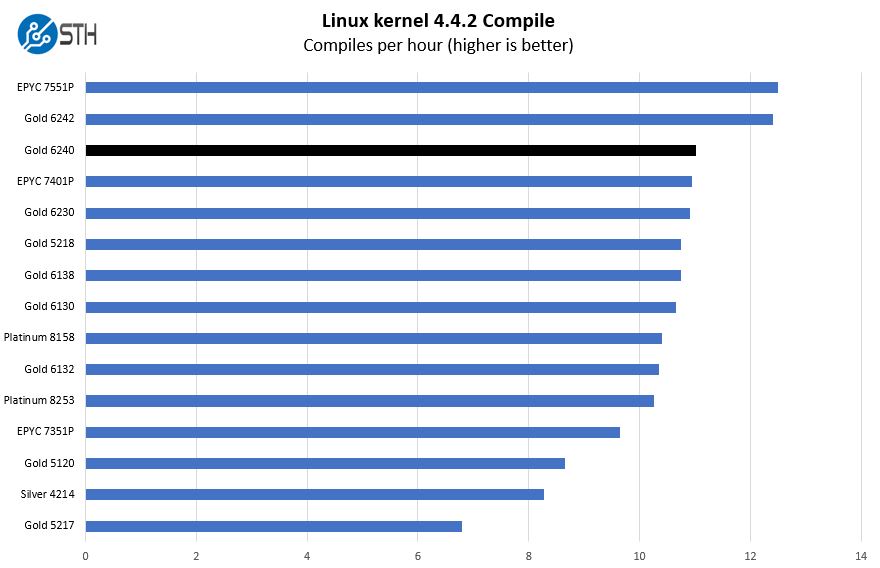
Here we wanted to point out a key performance characteristic of the Xeon Gold 6240: clock speed. With 18 cores, yet higher clocks, the Xeon Gold 6240 is able to out-perform the AMD EPYC 7401P, a 24-core part.
c-ray 1.1 Performance
We have been using c-ray for our performance testing for years now. It is a ray tracing benchmark that is extremely popular to show differences in processors under multi-threaded workloads. We are going to use our 8K results which work well at this end of the performance spectrum.
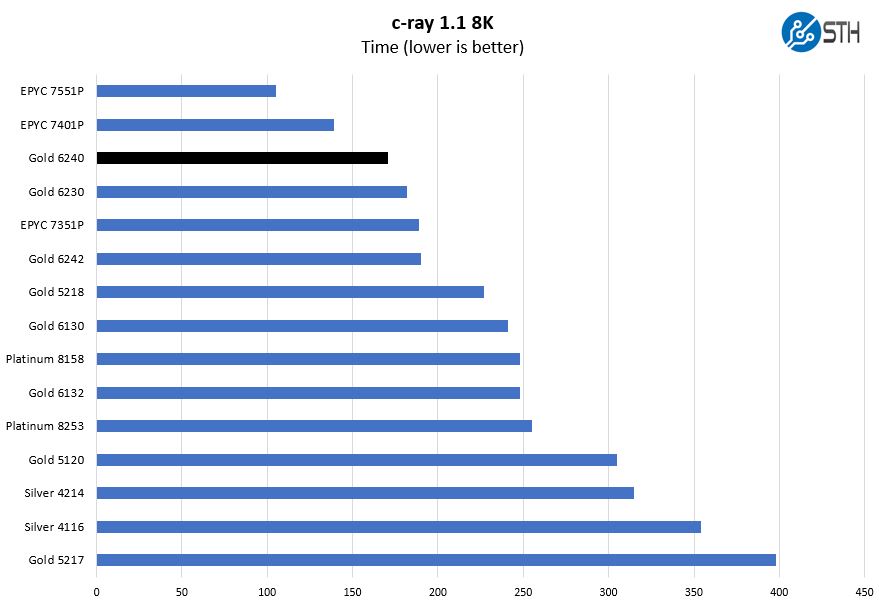
C-ray is a benchmark that AMD traditionally performs very well with. Still, the 18 higher-clock Intel cores are able to stay ahead of even higher-core count, lower clocked parts like the Intel Xeon Gold 6230 in a benchmark like this that threads well.
7-zip Compression Performance
7-zip is a widely used compression/ decompression program that works cross-platform. We started using the program during our early days with Windows testing. It is now part of Linux-Bench.
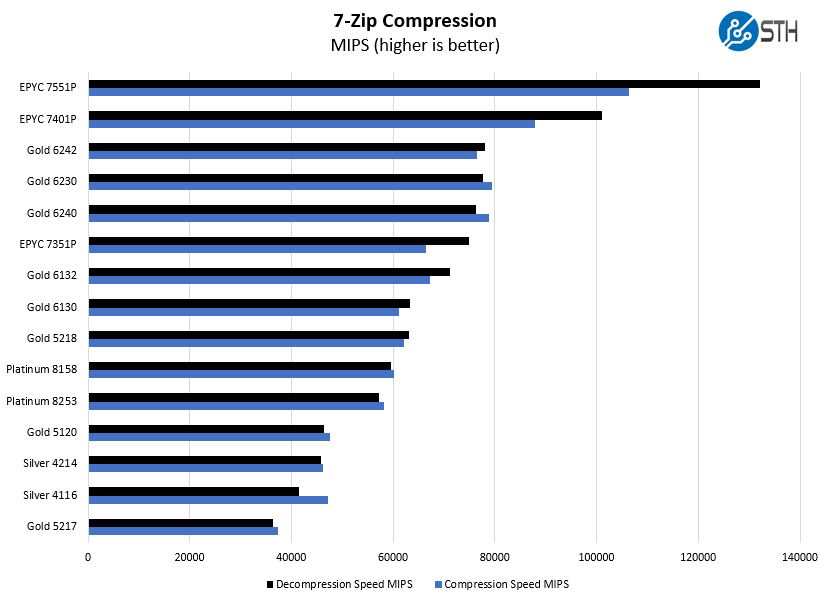
Perhaps the most interesting part of this result is that the Intel Xeon Gold 6240 (18 cores), Xeon Gold 6230 (20 cores), and Xeon Gold 6242 (16 cores) all perform relatively similar. That shows just how well Intel is able to tune chips through frequency and core counts.
NAMD Performance
NAMD is a molecular modeling benchmark developed by the Theoretical and Computational Biophysics Group in the Beckman Institute for Advanced Science and Technology at the University of Illinois at Urbana-Champaign. More information on the benchmark can be found here. With GROMACS we have been working hard to support AVX-512 and AVX2 supporting AMD Zen architecture. Here are the comparison results for the legacy data set:
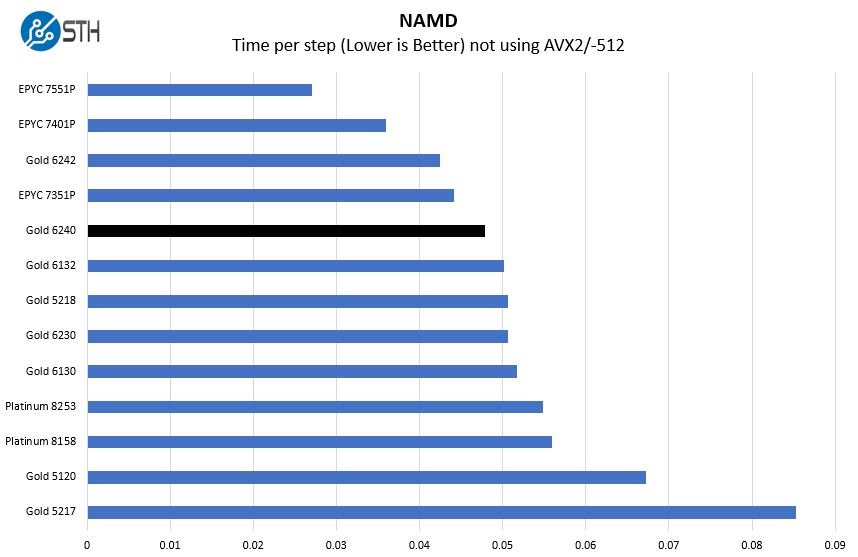
We wanted to mention here that performance is not only predicated by precious metal. Just because an Intel Xeon is labeled Platinum does not mean it is faster. The Intel Xeon Platinum 8158 is a great example of that, is the Xeon Platinum 8253.
Sysbench CPU test
Sysbench is another one of those widely used Linux benchmarks. We specifically are using the CPU test, not the OLTP test that we use for some storage testing.
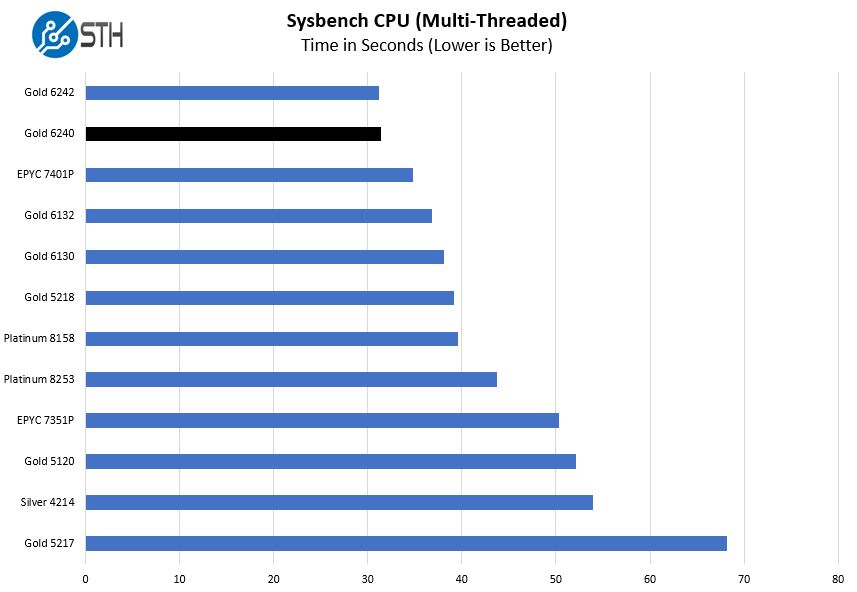
Here again, we see the Intel Xeon Gold 6240 perform close to the Gold 6242. Both chips have a better showing than the 2017-era AMD EPYC 7401P again in this test, driven by clock speeds.
OpenSSL Performance
OpenSSL is widely used to secure communications between servers. This is an important protocol in many server stacks. We first look at our sign tests:
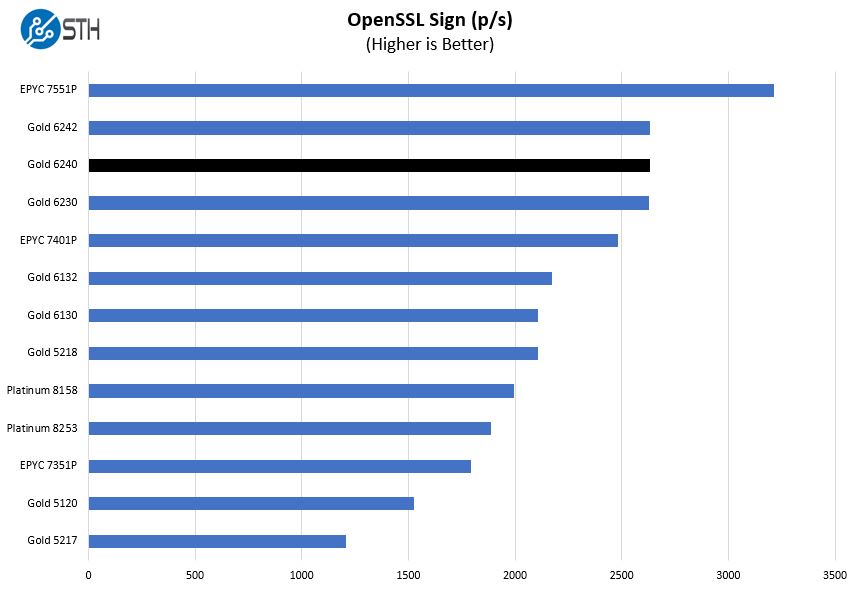
Here are the verify results:
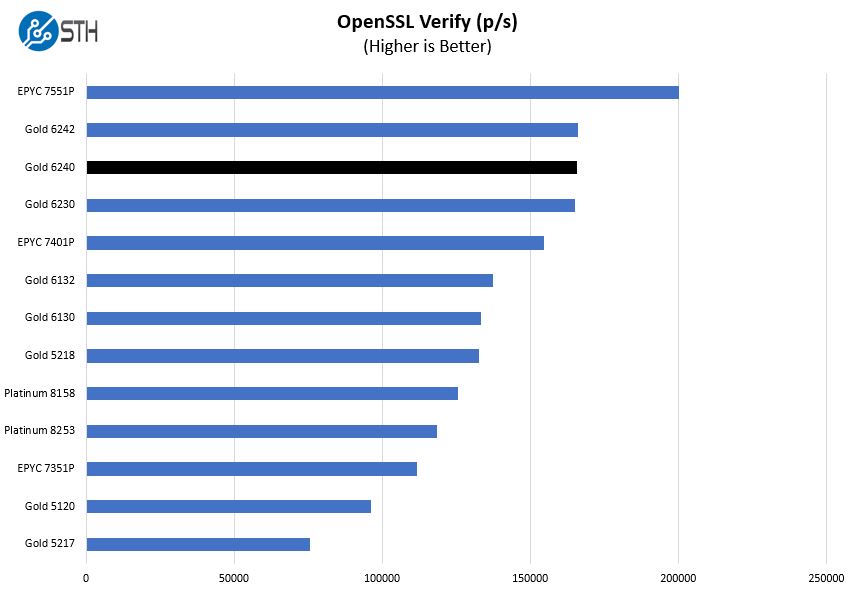
OpenSSL is a foundational technology. We again see the triumvirate of the Xeon Gold 6240, Gold 6242, and Gold 6230 place between the AMD EPYC 7551 and EPYC 7401 parts.
UnixBench Dhrystone 2 and Whetstone Benchmarks
Some of the longest-running tests at STH are the venerable UnixBench 5.1.3 Dhrystone 2 and Whetstone results. They are certainly aging, however, we constantly get requests for them, and many angry notes when we leave them out. UnixBench is widely used so we are including it in this data set. Here are the Dhrystone 2 results:
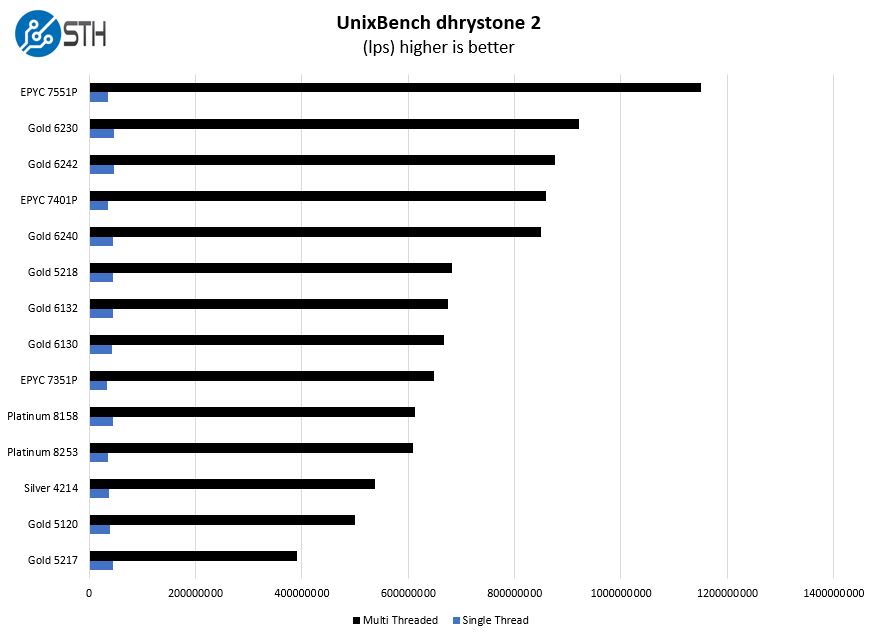
Here are the whetstone results:
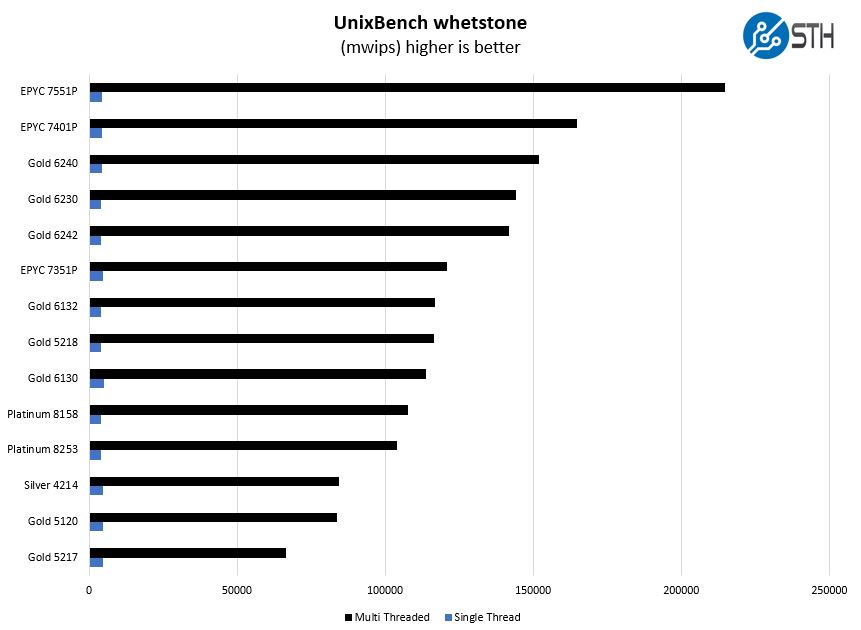
We again see great results here. The Xeon Gold 6240 pulls ahead slightly in these results.
GROMACS STH Medium AVX2/ AVX-512 Enabled
We have a small GROMACS molecule simulation we previewed in the first AMD EPYC 7601 Linux benchmarks piece. In Linux-Bench2 we are using our “small” case which is appropriate for single-socket servers. Our GROMACS test will use the AVX-512 and AVX2 extensions if available.
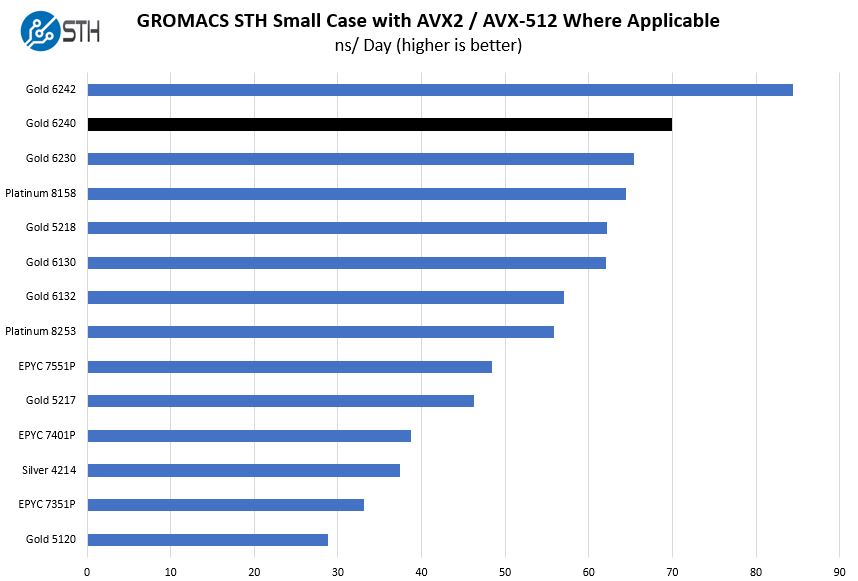
Perhaps the most interesting result is the Intel Xeon Gold 6242 which performed better than the Xeon Gold 6240 in this test. That is likely due to how the chips are handling AVX-512 work and clock speeds.
Chess Benchmarking
Chess is an interesting use case since it has almost unlimited complexity. Over the years, we have received a number of requests to bring back chess benchmarking. We have been profiling systems and now use the results in our mainstream reviews:
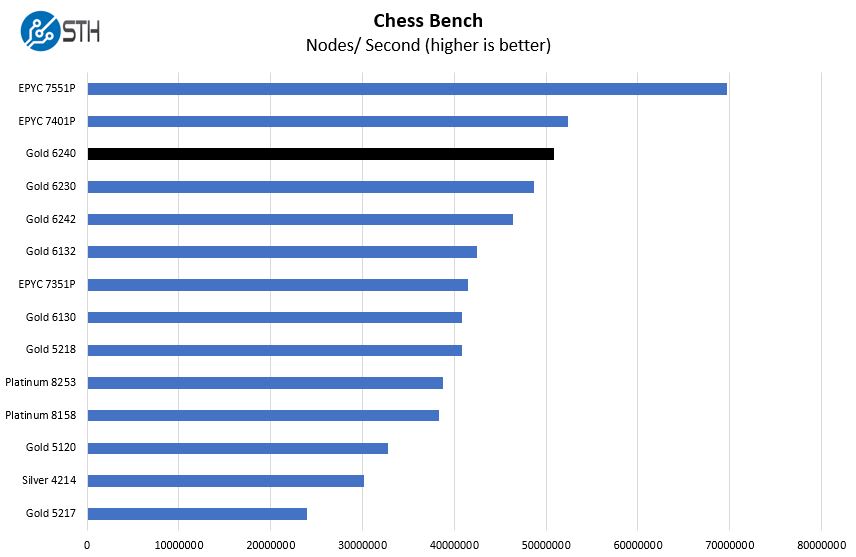
On the chess bench side, we see the Intel Xeon Gold 6240 pull off the top result, nearly matching the AMD EPYC 7401 with 33% more cores. If you license software by the core, then more performance per core is what you want.
Next, we are going to discuss market positioning before our final words.




The EPYC7371 is the direct competition imho, at a lower price, with 16 cores at high frequency and more memory bandwidth.
They’ve got too many damn SKUs.
Trades punches with the 7401P which is almost half the price, enough said.